Reproduction, Eggs, and Young of
California Toad - Anaxyrus boreas halophilus
(Baird and Girard, 1852)(= Bufo boreas halophilus


| Adults in the Mating Season | |||
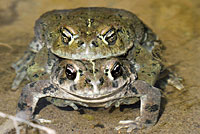 |
 |
 |
 |
| Male and female in amplexus, San Joaquin County |
Male and female in amplexus, with female laying eggs, San Joaquin County | A breeding male at the edge of a creek, San Joaquin County | Male and female in amplexus, San Joaquin County. The female takes the male for a swim across the creek. |
 |
 |
 |
 |
| A breeding male sits on some reeds at the edge of a breeding pond in Contra Costa County. I watched him swim back and forth, grabbing onto other males then releasing them. | A solo male swims toward a pair of toads in amplexus in a pond in Contra Costa County. | Male and female in amplexus surrounded by eggs, San Joaquin County |
A breeding male sits on some reeds at the edge of a breeding pond in Contra Costa County after an unsuccessful attempt to steal a female away from another male. |
 |
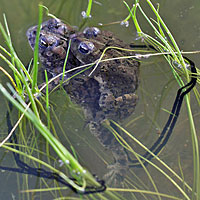 |
 |
 |
| Two solo males attempt to steal the female from a male in amplexus with her in a pond in Contra Costa County. | Male and female in amplexus, with toad egg strings, Contra Costa County |
Three pairs of adults in amplexus at an egg-laying site at the edge of a pond in Contra Costa County. There were five more pairs nearby. | Two pairs in amplexus and eggs at the edge of a pond in Contra Costa County. |
 |
 |
 |
 |
| A breeding male on the breeding pond in Contra Costa County. He was frantically swimming around trying to find a female. | Adults in amplexus with egg strings in the water, Los Angeles County. © Megan Harris |
Male and female in amplexus, Kern County © Henk Wallays | |
 |
 |
 |
 |
| Male and female in amplexus, Contra Costa County |
Male and female in amplexus, Contra Costa County |
Male and female in amplexus, Alameda County |
Male and female in amplexus, Contra Costa County |
 |
 |
 |
 |
| Male and female in amplexus, Riverside County © Lauren Tyson |
Male and female in amplexus and toad eggs, Orange County © Jason Jones | A congregation of breeding adults, February, Contra Costa County © Joyce Gross (Multiple amplexus, or mating balls, where numerous males surround one female can cause the death of the female by drowning.) |
Male and female in amplexus underwater with toad eggs in Riverside County. © Jeff Ahrens |
 |
 |
 |
|
| Male and female in amplexus in a pond full of toad eggs in Contra Costa County © Mark Gary |
Male and female in amplexus in a pond full of toad eggs in Contra Costa County © Mark Gary |
||
| Interspecific Amplexus and Necrogamy | |||
 |
 |
 |
 |
| Three toads attempting amplexus with a dead toad (necrogamy) Alameda County. © Mark Gary | A live adult male in amplexus with a dead female (necrogamy) Riverside County. The third pictures shows a male's typical amplexus hold around the females chest, holding her under the arms. © Jeff Ahrens | ||
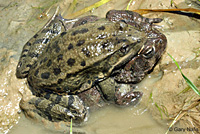 |
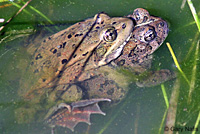 |
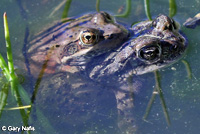 |
 |
| Adult male California Red-legged Frog in amplexus with a California Toad, Contra Costa County. |
Another adult male California Red-legged Frog in amplexus with a California Toad, Contra Costa County. |
Male toads in an Alameda County breeding pond, apparently attempting amplexus with a catfish. © Andy Hatch | |
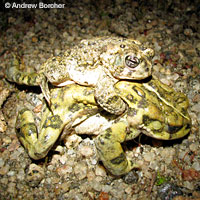 |
 |
||
| Adult male Arroyo Toad in amplexus with a California Toad in San Diego County © Andrew Borcher |
A California Toad attempts amplexus with a Western Spadefoot in San Diego County. © Andrew Borcher |
||
Eggs |
|||
 |
 |
 |
 |
| Eggs in a creek, San Joaquin County | Eggs at the edge of a pond, Contra Costa County |
Eggs at the edge of a pond, Contra Costa County |
Eggs at the edge of a pond, Contra Costa County |
 |
 |
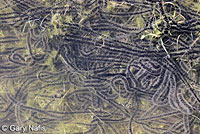 |
 |
| Eggs at the edge of a small pond, Alameda County | Egg strings, Contra Costa County | Communal mass of egg strings, Contra Costa County |
Egg strings, Contra Costa County |
 |
 |
 |
 |
| Egg strings covered with silt, Contra Costa County |
Egg strings in a creek, San Joaquin County |
Eggs, Contra Costa County | Eggs, Contra Costa County |
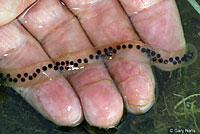 |
 |
 |
 |
| A single string of eggs, Contra Costa County |
Egg strings, Alameda County | Eggs, Contra Costa County. Not all eggs will hatch: these eggs at the edge of a pond dried out as the water level lowered. | Egg strings on pond, Orange County © Jason Jones |
 |
 |
 |
 |
| Adult male and eggs, Alameda County | Eggs, Alameda County | Eggs, Alameda County | Eggs, Alameda County |
 |
 |
 |
 |
| Eggs, Contra Costa County | Eggs, Contra Costa County | Eggs, Contra Costa County | Male and female in amplexus at egg deposition site. |
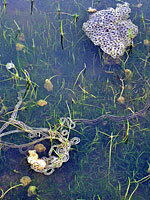 |
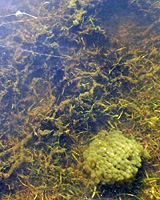 |
||
| There are three types of frog eggs in this Contra Costa County pond in mid March: the large mass on top is from a California Red-legged Frog, the long strings of eggs are from the California Toad, and the small balls of eggs are from the Sierran Treefrog. © Mark Gary |
There are four types of amphibian eggs in this Alameda County pond in late Fegruary: On the top left near the surface is a Sierran Treefrog egg mass. To the right and slightly below that is a California Newt egg mass. Below these small egg masses are several recently-hatched California Toad egg strings (no longer eggs, really.) And the large egg mass in the bottom right corner of the picture is from a California Red-legged Frog. © Mark Gary |
||
Tadpoles and Young |
|||
 |
 |
 |
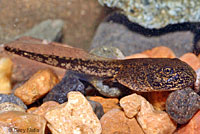 |
| Tadpole in pond, Contra Costa County | Tadpole in water, Contra Costa County | Tadpole in water, Contra Costa County | Tadpole in water, Contra Costa County |
 |
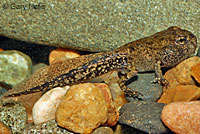 |
 |
 |
| Mature tadpole with four legs, in water Contra Costa County |
Mature tadpole with four legs, in water Contra Costa County |
Mature tadpole with hind legs, in water, Contra Costa County | Tadpoles at edge of puddle in a drying wash in May, San Bernardino County |
 |
|||
| Mature tadpole with hind legs, in water, Ventura County © Brian Hubbs | |||
 |
 |
 |
 |
| Dense mass of mature tadpoles at very shallow edge of pond, Contra Costa County | |||
 |
 |
 |
 |
| This is the same location in May where eggs and breeding activity were photographed and filmed in March, now filled with thousands of mature tadpoles. | This is the same location in June where eggs and breeding activity were photographed and filmed in March, now filled with thousands of recently metamorphosed young toads, shown here. |
Tadpoles in breeding pond, Contra Costa County |
Tadpoles, San Bernardino County |
| Recently-hatched Tadpoles |
|||
Recently-hatched tadpoles lay nearly motionless near the eggs for a few days after hatching. |
|||
 |
 |
 |
 |
| Newly-hatched tadpoles recently emerged from eggs, Contra Costa County | Newly-hatched tadpoles recently emerged from eggs, Contra Costa County | ||
 |
 |
 |
 |
| Newly-hatched tadpoles recently emerged from eggs, Contra Costa County | |||
 |
 |
 |
|
| These tadpoles just hatched from eggs, San Joaquin County |
Newly-hatched tadpoles recently emerged from eggs, San Joaquin County | Newly-hatched tadpoles recently emerged from eggs, Contra Costa County | |
| Transformed Juveniles | |||
 |
 |
 |
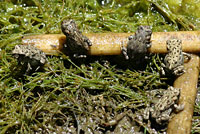 |
| Three newly metamorphosed juveniles with some of their tail remaining, Contra Costa County | Recently metamorphosed toadlets, Contra Cost County | ||
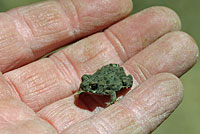 |
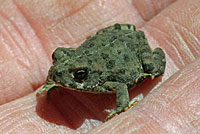 |
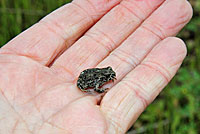 |
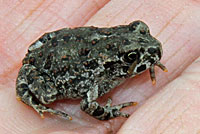 |
| Juvenile that has recently undergone metamorphosis and absorbed its tail. Contra Costa County |
Juvenile that has recently undergone metamorphosis and absorbed its tail. Riverside County |
||
 |
 |
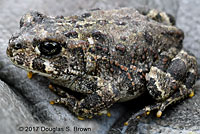 |
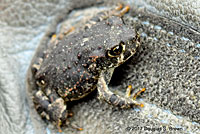 |
| After transforming from tadpoles, thousands of tiny toad metamorphs can often be found on the banks of breeding ponds. | These recently metamorphosed toadlets were found at about 9500 ft. elevation (2,900 m.) in the Sierra Nevada mountains on the Pacific Crest Trail near Mt. Whitney in Inyo County. At this elevation one might expect to see Anaxarus canorus - Yosemite Toad, but that species does not occur so far south. © Douglas S. Brown | ||
| Short Videos | |||
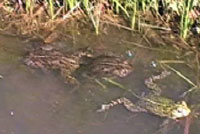 |
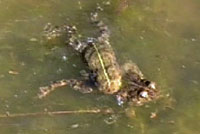 |
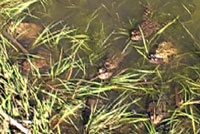 |
 |
| At a breeding location, you can often hear what sounds like a chorus of toads, especially when the toads are hidden in vegetation, but California Toads do not typically make advertisement calls to attract females. They vocalize when they encounter other males. Males in search of a female often swim around excitedly, approaching other males (as if they were females) and trying to steal away females in amplexus. These encounters are usually accompanied by a series of encounter calls (release calls) from the other male. Sometimes one toad in amplexus not in direct contact with another male will make a series of short, sharp, evenly-spaced peeps, which sound as if they could be a warning signal. It is probably the male that makes this sound, though I can't be sure. At times there was so much going on, it was hard to see which toads were making sounds. These videos show some of this breeding behavior at the shallow outlet of a pond in Contra Costa County where at least 8 solo males and 10 pairs in amplexus were observed in the area. Not all of them are seen in the videos. Some are heard off camera. |
Toads in amplexus laying eggs and swimming across a creek in San Joaquin County. | ||
 |
 |
 |
 |
| This video shows three groups of toad egg strings, first some single strings in a shallow creek, then two large collections of egg strings on two separate ponds. | Tadpoles that have just hatched from egg strings but are not yet moving in a rain pool in San Joaquin County. | Recently-hatched tadpoles lay around where they were hatched in a pond in Contra Costa County. They have not yet begun swimming. | Tadpoles in a creek bed in San Bernardino County. |
 |
 |
 |
 |
| Thousands of tadpoles swim along the edge of a pond in Contra Costa County. | Thousands of tadpoles forage in a thick mass at the edge of a pond in Contra Costa County. | Tiny, recently-transformed toadlets on the shores of two small ponds in Contra Costa County. | Thousands of recently-transformed toadlets, many still have a tail, hop around on the bank of a pond in Contra Costa County. This is the same place I watched adults breed and lay eggs three months earlier, which you can hear and see in the videos on this page. |
 |
|||
| This short video shows the life cycle of the California Toad, from the late winter breeding season when frenzied males call and compete and pair up with females who lay long strings of eggs, to tiny black tadpoles just emerged from the eggs then developing and forming huge feeding masses, to the tiny toads, recently-transformed from tadpoles, massing together around the pond edge then dispersing on their own, to an adult toad moving about on its own, as it will remain until the next breeding season. | |||
| Comparisons With Larvae and Tadpoles of Sympatric Species | |||
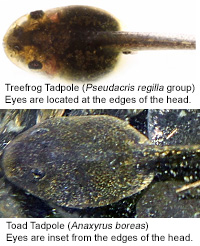 |
 |
||
| Comparison of Treefrog Tadpole (Pseudacris regilla group) (Top) with Western Toad Tadpole (Anaxyrus boreas) (Bottom) (Click on picture for a better view) |
Immature California Treefrog tadpole (Pseudacris cadaverina) (Top) Mature California Toad tadpole (Bottom) Ventura County © Brian Hubbs |
||
Return to the Top
© 2000 -
